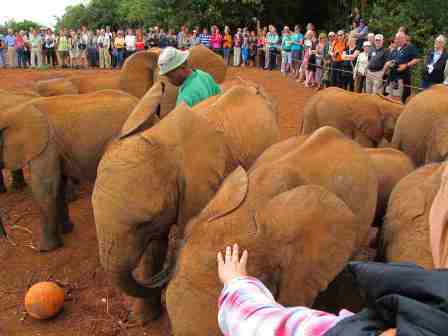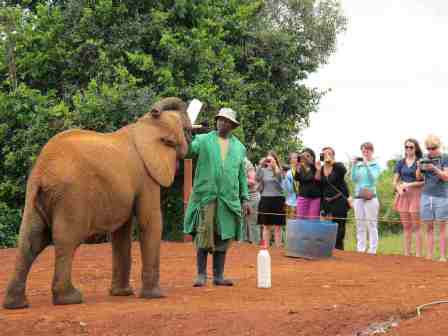A Series: Kenya 1; Visiting the Sheldrick Trust Part One
Today in the course of researching a new book on the lives of animals, I visited the famed elephant orphanage at the Sheldrick Trust. I got a privileged view.
Elephants Orphaned by Poaching. Photo by Carl Safina.
There are three basic problems creating orphan elephants at an escalating rate: exploding human populations across Africa (as in other impoverished places) have eliminated elephants from many countries. Everywhere elephants still exist, humans are pushing elephants into tighter quarters. Human population growth is the main problem, and Kenya's is growing rapidly. Relatedly, reserves and national parks are seldom large enough to contain elephant herds. Most herds cross in and out of protected boundaries. Outside, they run into new farms with irresistible crops, new settlements on traditional elephant migration routes, and angry, threatened villagers. Conflicts turn deadly for both elephants and humans. Third, increasing wealth in China has brought an insatiable demand for the elephants' long incisor teeth that we call tusks. As you know, the substance they're made of is called ivory.
Beautiful when carved, almost every piece of ivory has come from an elephant killed illegally. Prices have never been higher, and elephant poaching is now out of control. In many countries, corrupt officials are involved. In some, armies of rebel soldiers, or even armies of the regular government, are being sent across borders with modern military weapons to slaughter elephants to raise cash to fuel more fighting. Anti-poaching units are finding themselves outgunned. Poachers have hunted down and killed anti-poaching rangers. Rumor is that some poachers may now be using silencers and night-vision equipment. It's a nightmare scenario from the worst parts of the human mind, turned to deadly violence for nature and humans.
If you can put that out of your mind for a minute, the Trust is a delightful place. Not only is the compassion deeply touching and the baby elephants wonderful. But by saving and eventually re-wilding elephant orphans, the Trust also bears global witness for the holocaust bearing down on wild creatures, wild places, and especially elephants.
About a hundred tourists, almost all white, begin lining up along a rope bordering a patch of open ground. At the appointed time, a keeper in a green coat walks out of the bush followed single-file by about a dozen young elephants. The smallest, just waist-high, wears a blanket. The largest, whose shoulder is just above my eye-level, is about three years old and weighs an easy half-ton.
Other keepers are now manning two-dozen two-liter milk bottles. The milk disappears in great suckling chugs. All gone in a few seconds.
Nursing Orphan Elephant at the David Sheldrick Trust. Photo by Carl Safina.
While this is happening, one of the keepers give a long spiel about who they are, how they got here, ivory, and the severe new escalation in price, driven by demand in China. Overheard: A gray-haired man says to his wife, "How would China like it if Africans started coming to China and shooting their pandas?"


